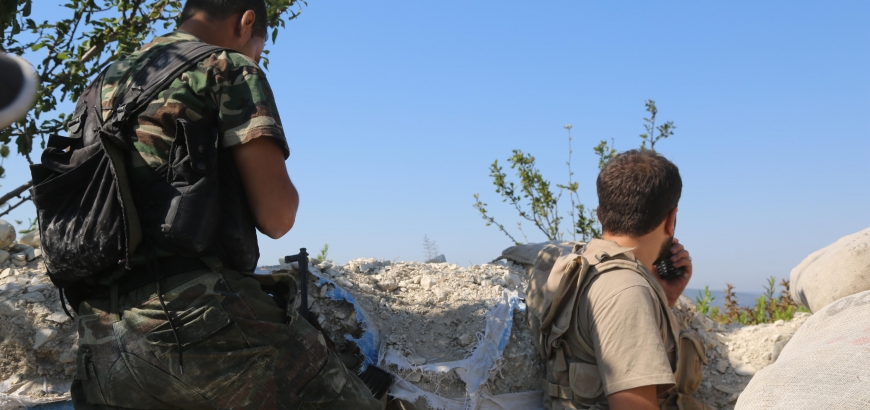Over the last few weeks, regime militias have suffered heavy losses in the al-Turkman and al-Akrad mountains in the Lattakia countryside, after sophisticated operations carried out by a number of rebel groups in the area, characterized by speed and surprise and secrecy, without achieving gains on the ground.
Last Tuesday morning, in just a few hours, a number of rebel groups in the northern Lattakia countryside took control of the strategic Burj Zahiyeh and 15 other small hills in part of a battle called, “If you enter, you will prevail,” before these groups returned to the positions from which they started, leaving more than 50 dead regime fighters behind them, as well as other material losses, according to numbers from the attacking forces and some activists in the Lattakia countryside.
This operation comes after a series of similar operations carried out by rebel groups that had the same military tactics, which depend on infiltrating the regime forces’ rear positions and carrying out surprise attacks with the aim of inflicting higher losses and then withdrawing to the defensive line without holding on to the territory.
Regime forces fragility
Since the start of the Russian intervention in Syria and regime forces taking control over most of the Lattakia countryside at the end of 2015, with the exception of some border areas with Turkey, most rebel group operations have been limited to defense. Even the previous operations required months of preparation and a large number of fighters—with news of the attack most likely reaching the regime before it starts.
But for the first time in years these operations had a different style and a change from the old strategy. A military commander in the First Coastal Division, Abou Yazin al-Shami, said that, “flash operations require a small number of fighters and fewer human losses because they neutralize the role of warplanes. They also don’t require heavy machinery, and currently the conditions are right for these sorts of operations.”
The military commander told Alsouria Net that, “the most important aims of these battles are to exhaust the regime presence in the Lattakia countryside and to reduce pressure on the Kabana front in the al-Akrad mountains and the northern Hama countryside, so that the regime does not withdraw additional forces to these fronts.”
The military commander noted an important point that had emerged in the recent fighting, which is the fragility of the Fifth Corps and its supporting militias in operations to defend the territory they control. In this respect, Shami said, “It’s well known that the summits in the Lattakia countryside, such as the Burj Zahiyeh summit, require heavy fire and preparation with heavy weapons because the artillery is in a better location. But in a recent operation, our fighters managed to enter within hours and kill dozens of fighters, which demonstrates the fragility of these forces.”
In addition to these operations, rebel groups stepped up their attacks on roads used by regime forces, and hit them with anti-armor missiles. Activists in the area over this and last month documented the destruction of four tanks and regime artillery in the Turkman and al-Akrad mountains.
In a related context, a first lieutenant who defected from regime forces, Yahya Burham, said that the rebel groups’ strategic change to not hold on to territory was, “a return to the first battles of liberation, when the regime was unable to hold out for long periods in the area during these attacks.”
He told Alsouria Net: “Direct military confrontation between the two sides means proportionate force, which is not currently available, especially with the presence of Russian warplanes, which are able to inflict precise damage. This strategy should have been used a long time ago—especially in the Lattakia countryside where the natural factors are appropriate.”
The war of attrition strategy is connected, in the military officer’s view, to two elements, which are “continuity and the diversification of operations” which are currently available and could be carried out, according to Burham.
Russian-Iranian dispute
Pro-regime media sites have recently revealed the extent of the impact of these battles on the regime, with the loyalist “Jableh and news agency” page saying that, “the number of martyrs and wounded in the Syrian army in the Lattakia countryside is unbelievable” and asked what were the reasons and saying there were ”things that were incomprehensible.”
A regime fighters in the Second Division stationed in on the Lattakia countryside fronts published the impact of the recent attack in a message on social media to the military command, calling for a committee from Military Security to be sent to investigate what he called the contempt of officers for the lives of conscripts, their cowardice and betrayal.
The fighter closed his message saying: “Ten men from the point where I was stationed were martyred. The colonel was in the back waiting terrified and prepared to withdraw. They left us in the vanguard and throughout the battle we thought that the territory to the left was friendly, but it turned out to be enemies.”
The recent battles in the Lattakia countryside have also revealed major disputes that have come into the open between Russia and Iran with regards to the command of the operations in the area.
Alexander Ivanov, a spokesman for the Russian Operations Center at the Hemeimeem airbase, openly accused the Fourth Division in regime forces of being responsible for the withdrawal of forces from the area, describing the withdrawal as “unjustified” and saying one could not be silent about it.
This article was translated and edited by The Syrian Observer. The Syrian Observer has not verified the content of this story. Responsibility for the information and views set out in this article lies entirely with the author


